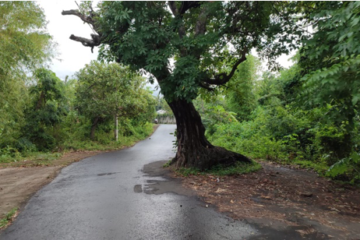A Case for Ignorance
By Annika Kraft

Ignorance leads a shadowy existence in the modern cultural and scientific history of Europe and the West, which is built on opposites: culture–nature, science–religion, ratio–emotion, knowledge–ignorance. Ignorance tends to be seen as a state that can be overcome and is all too often confused with incompetence in a professional context. Many thinkers regarded modernity as being disenchanted and not, as Max Weber so succinctly put it, because we know everything, but because we think we can potentially know everything. We have not replaced ignorance with knowledge, but the recognition of our ignorance with the attitude that science and technology could ultimately let us know everything. The increasing technical ability to shape the world has arguably given the impression that we can design the world entirely to human needs, ‘re-inventing Eden’, making the earth a place that is the perfect habitat for humans, not for other creatures and forms of being. The consequences of this are clearly visible to everyone today and ecological crises, species extinction, and climate change bespeak the lie of the modern myth of progress. Not only do we live on a planet whose resources are limited, but we are also part of a complex, fragile ecosystem that we have already severely altered. And this has a lot to do with the fact that we have ignored what we do not (or cannot) know about this system for many decades.
Not knowing is an integral part of human life, a conditio humana. Fact is, due to the nature of our cognitive capacity, but also the structure of our world, we will probably never be able to know certain things entirely: Past and future, the inner perspective of other beings, the complexity and entanglement of natural systems, and the risks and consequences of the technologies that we only bring into this unknown equation will always elude our efforts to fully know them. This is because science not only constantly uncovers more unknowns but also creates new unknowns itself in the form of incalculable risks of new technologies and interventions in complex ecosystems that are not fully understood. All too often our solutions turn out to create new problems.
The question therefore is not how we can replace our constant ignorance with knowledge, but how we can deal with what we do not (or cannot) know. There are areas where we have to approach ignorance as the shortcoming it is—like ethics. But there’s more to ignorance than being the lack of something. In science, aesthetics, and, for whom this is suitable, spirituality, ignorance can be more of a resource than a deficiency. And key is the ancient philosophical wisdom of conscious ignorance or as Socrates put it: “I know that I know nothing.”
In ethics the question is how to act with entities, living beings, and interdependent, complex systems we don’t fully know about. Where we lack the main condition to evaluate our actions—the consequences—we have to act cautiously and cultivate ‘ethics of not-knowing’. Bill Vitek and Wes Jackson in their collection on ignorance-based environmentalism suggest a cultivation of virtue ethics. Acting in a world that defies our categories and control requires an attitude of humility. Let me cite Peter Reed here: “Faced with such [nonhuman] values, the appropriate human virtues are self-restraint, hesitation, a respect for the mystery of the world, and a willingness to leave it at that.” None of these virtues are very popular among modern societies which function on a progressive narrative, neither is the willingness to cautiously act in a state of ambiguity, showing that conscious ignorance since Socrates didn’t lose its revolutionary potential.
In an academic culture where it’s nearly impossible to publish a paper that addresses only what we don’t know and it’s always important to produce new knowledge, how can ignorance be seen as a fruitful perspective in science? First, we must change our expectations. Instead of expecting science to resolve problems, reduce complexity, and make the world controllable, we have to see science as an instrument to, first and foremost, perceive complexity. This also means a break with the usual dichotomies: Ignorance is not the opposite of, but an integral part of knowing. The scientific endeavor is not replacement of ignorance with knowledge, but as Stuart Firestein put it ‘higher-quality ignorance’ which means the ability to ask increasingly thoughtful questions about our research objects. Conscious ignorance then might even make things visible that are left unseen by a knowledge-based approach. As Jay Johnston argues, an attitude of ‘strategic inadequacy’ can serve as an epistemic tool to open us for the agencies of other-than-human beings, our entanglement and dependency, and the possibility of being transformed while researching about them.
In questioning the way we perceive the world, we’re entering the field of aesthetics, specifically nature aesthetics, and find the intimate link between ignorance and an emotional attitude that has several benefits not only for ethical behavior, but also for our mental health. We’re talking about awe. Of course, “the unknown as such doesn’t fill us with awe,” but awareness with a beginner’s mind does. Beginner’s mind is a conscious state of not-knowing, of just being present, not judging, but wondering. Like this, awe can be felt not only towards things beyond our epistemic grasp, but in recognition of the unapproachable mystery in every part of nature—even the seemingly known and profane ones—and helps us to appreciate the natural world more profoundly. What could be called ‘humble ignorance’ and what nature writers and environmental activists like Rachel Carson had deeply internalized ultimately means a sense of wonder in observing and sensing nature and gaining a humble sense of our place on Earth.
Much more could be said about that which most people believe deserves no words: our ignorance. But let me leave it at that: Ignorance in our times surely isn’t just a deficiency but treated rightly might be our greatest potential. After all, if disenchantment, as Max Weber put it, is the state not where everything about the world is known, but humans have the rather arrogant belief that everything is potentially knowable, then conscious ignorance might be able to restore the mystery that modernity bemoans. The mystery of what it means to be human on this planet, abundant of life, drifting in an infinite cosmos, following the rhythms of nature; to be insignificant and one’s whole cosmos at the same time; to wonder and to live along the questions and to, despite feeling separated in our human world, being part of this complex unfolding all at once.
#
Annika Kraft is a PhD candidate in the study of religions at the University of Münster (Germany). In her project she researches religion, science, and popularization. Her interests lie in the European history of religion, aesthetics, environmentalism, and nature.
Counterpoint blogs may be reprinted with the following acknowledgement: “This article was published by Counterpoint Navigating Knowledge on 25 October 2025.” The views and opinions expressed on this website, in its publications, and in comments made in response to the site and publications are those of the author(s) and do not necessarily reflect the views and opinions of Counterpoint: Navigating Knowledge, its founders, its staff, or any agent or institution affiliated with it, nor those of the institution(s) with which the author is affiliated. Counterpoint exists to promote vigorous debate within and across knowledge systems and therefore publishes a wide variety of views and opinions in the interests of open conversation and dialogue.
Photo credits: Free download from Pixabay.



0 Comments